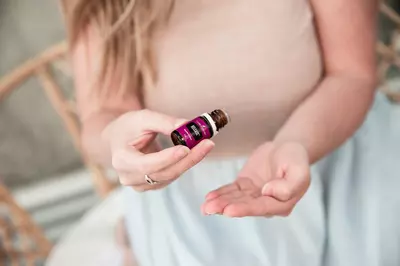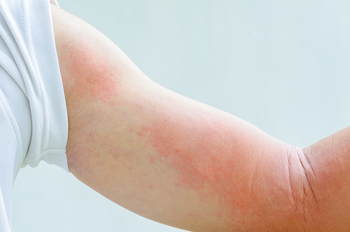Are Essential Oils Safe?

Most essential oils are safe and free of adverse side effects when used properly. However, as with any substance you are introducing into your body, it is important to use them intelligently. We recommend that you never eat or drink essential oils. You should pay attention to the following factors.
Dosage
Dose is the most important factor in essential oil safety. Some essential oils used in the wrong doses or too high a concentration have been found (in animal and laboratory studies) to contribute to tumor development and other harmful changes in the body. Some essential oils can even be damaging to the skin, liver and other organs if used improperly.
Purity
Sometimes essential oils are altered by adding synthetic chemicals or other, similar smelling, essential oils or they are sometimes diluted with vegetable oil. Look for language indicating purity on the label. It is not necessarily bad if the label indicates, for example, that the bottle contains 20% essential oil and 80% vegetable oil. This is sometimes done so that popular but expensive oils like rose or neroli (that can cost over $100 per teaspoon when pure) can be made more affordable. If you think you are starting with 100% essential oil and you are not, however, you may be disappointed with the results. On the other hand, if you are starting with professional quality essential oils, which are generally much more concentrated, you need to dilute them to be safe.
Application method
 An essential oil that is safe when applied in one way may not be safe when used in another way. Some oils are considered safe if inhaled, and yet may be irritating if applied to the skin in concentrations as low as 3-5%. Thyme, oregano, clove, and cinnamon bark essential oils are examples of this. Several of the citrus oils, such as bergamot, lemon, lime, orange, and angelica, can cause phototoxicity (severe burns or skin cancer) if there is exposure to natural sunlight or sun-bed radiation following skin applications, whereas this would not result from inhalation.
An essential oil that is safe when applied in one way may not be safe when used in another way. Some oils are considered safe if inhaled, and yet may be irritating if applied to the skin in concentrations as low as 3-5%. Thyme, oregano, clove, and cinnamon bark essential oils are examples of this. Several of the citrus oils, such as bergamot, lemon, lime, orange, and angelica, can cause phototoxicity (severe burns or skin cancer) if there is exposure to natural sunlight or sun-bed radiation following skin applications, whereas this would not result from inhalation.
Be sure to clarify the recommended application method and concentration for the essential oil and intended use. And once again, don't ingest oils without professional guidance.Possible drug interactions
There is little published research on interactions between pharmaceutical drugs and essential oils. Given the complex chemistry of essential oils, however, it makes sense that this is possible or even likely. As with dietary supplements and herbs, it is important to discuss regular essential oil use with your healthcare provider and together assess any potential risks and benefits. For example, studies indicate that peppermint and eucalyptus oils increase the skin absorption of 5-fluorouracil, an anti-cancer drug (Abdullah et al 1996, Williams & Barry, 1989).
Don't forget to dilute!
As stated earlier, it is important to note that most essential oils cannot be applied directly to the skin (without being diluted). Refer to the section "How do I choose and use essential oils?" for more information on dilution and carrier oils.
Can essential oils be toxic?
Toxicity rarely occurs with appropriate use of essential oils and is primarily attributed to misuse and accidental ingestion, especially in young children. Essential Oil Safety by Tisserand and Balacs, 1995, is a valuable reference to understanding potential toxicity and lethal dosages. Again, we recommend that you never eat or drink essential oils.
General safety recommendations
- Research each oil by reading about it in books or looking up information on the web
- Adhere to all cautions for not overdoing it
- Follow recommendations for diluting the oil
- Identify a knowledgeable person who can answer your questions
Special considerations

Children
In general, you should adjust dosages downward for children, but also use extra caution in choosing essential oils to be used in babies and children (or avoid use altogether). Some essential oils, such as peppermint, should not be used with children younger than six years old. Menthol-one of the major chemicals in peppermint oil-has caused breathing to stop in young children, and has caused severe jaundice in babies with G6PD deficiency (a common genetic enzyme deficiency) (Price & Price, 1999).
Always store essential oils out of reach of children, in bottles with single-drop dispensers. Accidental ingestion of amounts as small as a teaspoon has resulted in death.

Pregnancy
You should also exercise caution with essential oils if you are pregnant, since essential oils can cross the placental barrier and there is little clinical research in this area. Very gentle essential oils, such as true lavender (Lavandula angustifolia) are sometimes used by midwives during and after labor and delivery with favorable effects (Burns et al., 2000).
In general, however, similar cautions during pregnancy and infancy/early childhood should be used with essential oils as with other substances. If you are in doubt, contact a knowledgeable healthcare provider.
Could I have an allergic reaction?
 A small proportion of people may experience skin irritation, allergic reactions, or cross-sensitivity to essential oils. Cross-sensitivity is the potential for an allergic reaction to similar substances (for example, if you are allergic to ragweed, you might also be allergic to chamomile essential oils).
A small proportion of people may experience skin irritation, allergic reactions, or cross-sensitivity to essential oils. Cross-sensitivity is the potential for an allergic reaction to similar substances (for example, if you are allergic to ragweed, you might also be allergic to chamomile essential oils).
Irritation is characterized by a rapid onset redness and pain in the skin exposed to the essential oil. It can occur with the first exposure. The skin generally heals without long-term problems, but you probably would not want to use the essential oil that caused the irritation again.
Some problems of this sort have been caused by oils adulterated with synthetic chemicals or chemically changed by exposure to heat or light over time. Thus, if you really like the essential oil that seemed to cause the skin irritation, you might try a different brand (following the guidelines given previously for choosing essential oils).
Contact sensitivity
Contact sensitivity is a type of allergic reaction. This can happen anytime after the first exposure to an essential oil, and usually presents as an itchy rash or hives. This is caused by the immune system's response to one or more of the chemicals in the essential oil. The extent of the reaction may seem out of proportion to the amount of exposure. Again, old or altered essential oils are more likely to produce skin reactions (Tisserand & Balacs, 1995).
Patch testing
If you are someone who is taking a lot of prescription medication and/or has a lot of allergies, you should do a patch test by following the instructions below to check for skin irritation and sensitivity before using each essential oil.

How to do a patch test
- Mix a very small amount of essential oil/carrier at twice the concentration you plan to use. For example, if you plan to use a 3% mixture of the essential oil, mix it at 6% (six drops in a teaspoon of carrier oil, or three drops in ½ teaspoon of carrier oil).
- Using the inside of the forearm, apply a couple drops of your double concentration mix to the pad of a bandaid and keep the bandage on the skin. After 48 hours remove the bandage and check for irritation.
- You may repeat to check for allergic sensitivity. Remember, however, that allergies can develop any time after the first exposure; thus absence of a reaction does not necessarily mean that an allergy will not develop with later exposures.
- If the skin under or around the bandage becomes red, swollen, itchy, or develops blisters, that is a reaction and you should avoid skin exposure to the essential oil you tested.
What is phototoxicity?
Phototoxicity can occur after you apply an essential oil topically and then go out into the sun. This happens most often with certain citrus oils, such as bergamot, lemon, lime, orange, and angelica.
For example, if you spray yourself with a solution of orange essential oil and then lie out in the sun or in a tanning bed, you will most likely get a sunburn or even deeper burns.
Summary
As you can see, there are safety concerns associated with improper use of essential oils. In general, however, essential oils are safe when used externally (not ingested) in low concentrations. For skin applications, that usually means concentrations no higher than 5%. For inhalation, use intermittent exposure (not more than 15 minutes in an hour). There may not be any safety information on the bottle, but usage guidelines may be posted near sales displays, on company websites, or available through company sales representatives.
If in doubt, always consult a healthcare provider you trust who is knowledgeable about essential oils or willing to investigate with you. There is a great deal of information about essential oils available on the internet, and it may be difficult to critically determine its integrity.
Abdullah, D., Ping, Q., Liu, G. (1996). Enhancing the effect of essential oils on the penetration of 5-fluorouracil through rat skin. Yao Xue Xue Bao, 31(3) 214-221.
Brandao, F. M. (1986). Occupational allergy to lavender oil. Contact Dermatitis, 249-50.
Buckle, J. (2003). Clinical aromatherapy: Essential oils in practice. New York: Churchill Livingstone.
Burns, E., Blamey C., Ersser S., et al. (2000). An investigation into the use of aromatherapy in intrapartum midwifery practice. The Journal of Alternative & Complementary Medicine, 6(2) 141-147.
Clark, S. M., & Wilkinson, S. M. (1998). Phototoxic contact dermatitis from 5-methoxypsoralen in aromatherapy oil. Contact Dermatitis, 38, 289-290.
Hammer, K. A., Carson, C. F., Riley, T. V., & Nielsen, J. B. (2006). A review of the toxicity of Melaleuca alternifolia (tea tree) oil. Food & Chemical Toxicology, 44(5), 616-625.
Kejova K, Jorova D, Bendova H, Gajdos P & Kolarova H. (2010). Phototoxicity of essential oils intended for cosmetic use. Toxicology in Vitro, 24 (8), 2084-9.
Price, S. & Price, L. (2007). Aromatherapy for health professionals, 3rd Ed. Philadelphia: Churchill Livingstone Elsevier.
Tisserand, R. & Balacs, T. (1998). Essential oil safety: A guide for health professionals. Edinburgh: Churchill Livingstone.
U.S. Food & Drug Administration: Aromatherapy, March 13, 2000
http://www.fda.gov/cosmetics/productandingredientsafety/productinformation/ucm127054.htm
Vigan M. (2010). Essential oils: Renewal of interest and toxicity. [Review]. European J of Dermatology, 20 (6), 685-92.
Williams, A. & Barry, B. (1989). Essential oils as novel human skin penetration enhancers. International Journal of Pharmaceutics, 57, R7-R9.


